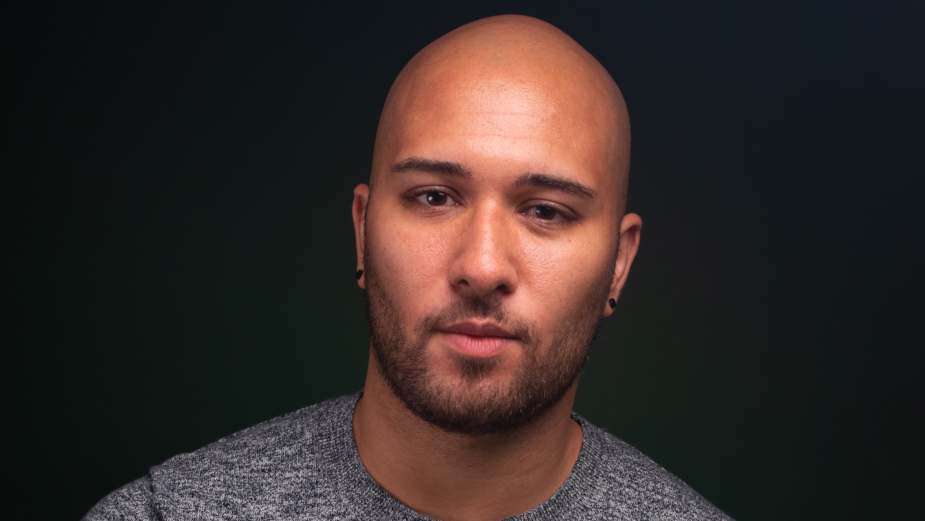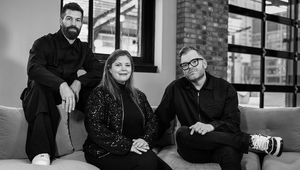
DE&I: Accelerating Change with Necko Fanning

Necko Fanning is a DEIB strategist and expert specialising in inclusive language and content, definable shifts to organisational culture, and cultural competency. He is also the NA director of DEIB for Havas Creative.
A logophile and wordsmith by trade, holding a degree from the University of Michigan in creative writing, Necko has leveraged his passion for language to create work on different social justice topics for publications such as SelfHIMprovment, The Inclusion Solution, and the New York Times. He is the editor of All In Musings, a Havas blog focused on allyship through storytelling.
As a veteran and multi-racial, queer-man, Necko is passionate about the influences of intersectional identities on selves and business prerogatives. He can be found smuggling too many books past his partner or imploring his Great Dane, Salem, to share the couch.
LBB> What drew you to the field of DE&I?
Necko> I got my first taste of DEIB work while I was in the United States Army. I was one of the first soldiers to come out after the repeal of DADT (Don’t Ask, Don’t Tell) and quickly saw the disparities separating my white, straight, male co-workers from all those who identified or existed as something other. I worked for an incredible team of women at the time, and it stuck with me how unfair it was they weren’t being promoted as quickly or receiving the same treatment as the men in our organisation. So, at first, it was this idea of equity vs. equality, and fairness overall, that drew me into DEIB work.
LBB> Before it became your job role, what was your specialism? And how did you get involved?
Necko> I’m one of those fortunate few where DEIB work has always been in my orbit. I haven’t always had the words for it; at times it was simply called social justice and activism, but I’ve been leveraging my skills and position to drive change since I entered the workforce. I attended the University of Michigan and earned my creative writing degree not only because writing was a passion and a skill I wanted to hone but because I saw that medium as an opportunity to widen the scope and audience of my DEIB work.
LBB> There’s a lot of frustration around the industry’s glacial pace when it comes to improving DE&I across all sorts of axes. What’s getting in the way?
Necko> Wow, where to start. In my opinion, people are rightly frustrated with how slowly we’re seeing the influence of DEIB programs and systemic changes. A large part of that has to do with how DEIB experts and professionals are treated within their respective organisations. When organisations don’t provide resources (both financial and personnel) for DEIB practitioners, they effectively relegate those individuals into performative roles. Folks who look to these positions to come in as changemakers then become, again rightly so, frustrated with the lack of process and begin to question the efficacy of DEIB as a whole.
Additionally, and perhaps a slightly more unpopular opinion, DEIB professionals need to be assessed on a more rigorous scale.
This is a relatively new field. As proof, we need only examine the fact that many secondary education institutions will offer DEIB majors and minors for the first time in 2023–2024. Many DEIB practitioners haven’t been given the tools and training they need to excel with this work. They haven’t been taught the importance of data and research, conflict mitigation, how to work with executives in the languages they understand to transform them into change ambassadors, cultural competency and fluency, and even basic program/project management skills. These are all foundational to the work we do. When companies don’t check to make sure that DEIB professionals possess these skills - and worse, don’t provide training and education to level up - they risk stagnating an organisation’s DEIB development.
Please don’t mistake what I’m trying to say; DEIB practitioners are essential to change and future success at all organisations. But having passion for this work simply isn’t enough anymore. Folks need to be able to demonstrate a capacity to lead DEIB in culturally nuanced and programmatically advanced ways.
Finally, we’ve reached a point where we can’t talk about DEIB work without talking about how it’s being politicised. Governors of Texas and Florida are leveraging different legislation and executive powers to limit or entirely remove DEIB efforts. In so doing, they’re drawing a line in the sand that’s only going to make it that much more difficult for companies and organisations that want and need DEIB work (i.e., all organisations and companies) to reach their goals and increase their diversity across all areas.
Put simply, outlawing critical race theory, DEIB and Black/African American studies in schools and the workplace makes it pretty difficult to advance causes related to those fields.
LBB> Outside the advertising industry, where do you see examples of large-scale meaningful progress (if at all), and what should our industry learn from it?
Necko> There are many advanced trainings we can take from companies like Bumble, Deloitte, and even Netflix. But one of the most poignant examples comes from the biggest name in professional social media: LinkedIn.
LinkedIn compensates ERG leaders at $10K per year, compounding for every year they serve in their position. This couldn’t be a clearer demonstration of the investment and importance of DEIB, with the key takeaway here being that ERG leaders, who provide an important service to any organisation, should be compensated financially for the work they do.
ERGs have a disproportionate benefit to advertising/media/creative industries often at the unacknowledged, uncompensated cost of the employees, chief among them being women of colour. By compensating ERG leaders, businesses make a clear statement valuing work often leveraged to demonstrate their inclusivity and engagement with clients.
LBB> The dimensions of DE&I can differ somewhat according to geographic/cultural context. Where you’re based, what are the big issues or most urgent elements of DE&I that you need to address? And if your role covers more than one market/territory, how do you and your team navigate the local nuances while having a cohesive and consistent set of values?
Necko> I’m guided by those original values that brought me into DEIB: equity and universal fairness. But I’m also compelled as a gay, multiracial, and multiethnic disabled veteran by the sense of fear many of the communities I exist within feel. As someone with so many intersecting identities, that fear shifts depending on where I am and serves as a constant reminder of how communities are affected in big and small ways depending on where they reside.
A quick exercise is “how comfortable do you feel walking to your car alone at night?” It’s my experience that women, queer folks, and people of colour often have a very different take on this than their counterparts, especially depending on where they reside in the country.
Without a doubt the biggest issues DEIB needs to address in the locations I operate are Black representation within the workforce, digital and physical accessibility for folks living with disabilities, and education for our most senior leaders on how to make the leap from being aware of issues to becoming culturally fluent change ambassadors. I say these are the most pressing, but there are many other issues (transgender inclusion, gender pay equity, AAPI hate and microaggressions, the earthquake crises in Syria and Turkey that are weighing on the minds of many MENA employees, and more) that are of the same importance. The juggling act for a DEIB professional is triaging need based on our own bandwidth.
LBB> In your role, what have been some of the most meaningful projects or policies you’ve been involved in regarding DE&I?
Necko> Personally, I’m rewarded most when I’m able to create content that allows for the meaningful education of folks. In 2022 I created a DEIB-focused publication (housed on LBB) called All In Musings (AIM), a derivative of our Global DEIB brand, All In. The goal of this publication is to encourage folks from different backgrounds to dig into their experiences in the workplace and chat about ways in which their coworkers can be better allies to these communities.
But I’m most proud of a new initiative that we’ve begun out of our Havas New York office, called Executive Leadership Cultural Competency training. Essentially, these are confidential one-on-one sessions with leadership where we delve into questions like “What’s the difference between Black and African American?” and “How do you effectively recover from misgendering someone in the workplace without overburdening that person with your guilt?” This training seeks to create a space for leaders to learn from their mistakes and dig into questions they wouldn’t feel comfortable asking anywhere else.
I see this as critically important to shifting culture; if our leaders understand deep in their bones why these issues are important, how fixing them can influence the bottom line, AND are able to engage in conversations with confidence and cultural competency, that’s really where we start to see leaps in progress.
LBB> What role are clients playing in holding agencies accountable and driving better DE&I (e.g., via RFPs)? Is this something you are seeing or would like to see more of?
Necko> Clients, without any doubt, have the most power to hold companies accountable. I’ve begun seeing DEIB questions in practically all RFPs/RFIs, but I’m also seeing instances where clients are featuring this as a 'nice to have' versus 'critical to the mission.' I would love to see clients put these as top-line requests with harder-hitting questions that go beyond asking for the racial and ethnic makeup of organisations. Clients have the power to generate urgency within organisations to address DEIB issues, and with that urgency comes the potential for rapid and widespread change.
LBB> We often see DE&I siloed or pigeonholed as an HR issue. What’s the key to ensure that it’s embraced as an agency-wide or industry-wide responsibility?
Necko> I’m just going to say it: HR is not DEIB and DEIB is not HR. I often try to highlight the difference by offering this example: DEIB is preventative medicine and HR is surgery and procedures. HR folks have a set of skills and abilities they’ve trained for years to hone so they can serve as a company’s line of defence, whereas DEIB is a new field emerging from an employee population need for better representation and systemic disruption. While many of the issues we handle overlap, and we often work together, our approach to them can be vastly different.
Additionally, when HR leaders are asked to lead DEIB initiatives, it’s often one more thing on an already-full plate. It’s simply not fair to them, nor is it fair to the employees; DEIB can often facilitate safe spaces to talk through ideas you wouldn’t want to bring to HR at that time. The key to ensuring this separation is simply investing in DEIB and educating stakeholders on how investing in this field will result in long-term ROIs.
LBB> What are your thoughts about where accessibility fits in the DE&I agenda?
Necko> Look, lots of organisations don’t invest in equity and accessibility because, on paper, it doesn’t look sexy to them. But it says it right there in the name: the ‘E’ is for ‘Equity.’ Accessibility - both digital and physical - is often thankless work. It requires reviewing internal policies, engaging in development plans when physical spaces are being altered, leveraging training to make sure design/UX/CX are all being done with best practices, and shifting the day-to-day in sometimes dramatic ways. And it’s not cheap. But any organisation that says it’s investing in DEIB isn’t doing all the work if they aren’t actively working how to make spaces - virtual and physical - more accessible.
LBB> The covid-19 pandemic resulted in dramatic changes across the industry. The pandemic pushed organisations to create remote and hybrid work models that seem to receive high praise from employees. But the pandemic also resulted in women and caregivers leaving the industry. Is there a relation between these? What do you believe are the positive and negative outcomes?
Necko> It's my professional opinion that remote and hybrid working options are exceptionally positive for most employees. And research supports that: 74% of employees feel happier when they work remotely, 50% of employees would gladly take a pay cut to have the option of continuing to work remotely, 79% of participants in one research study said they would be more loyal if an employer allowed a more flexible setup, and an incredible 97% of remote employees want to continue working remotely until the end of their careers. That’s not even mentioning the average $11K per employee that can be saved by switching to a hybrid model or that remote employees actually work 10% longer than their office counterparts.
Works Cited
11 Surprising Statistics on Remote Work for 2023
Empower Employees and IT Teams With Modern Digital Experiences
Remote Work Statistics & Trends: The Latest in Remote Work
But the pandemic was/is a horrific tragedy, and the soil these inclusive opportunities sprung out of was the same used to bury mothers and caregivers with crushing responsibility. I wouldn’t ascribe blame to remote and hybrid working options as much as I’d look to how women have been treated in the workplace and how gender roles often play out in our society. Women in the workplace are often pressured out of career paths - something we saw as women overwhelmingly left the workplace during the pandemic - to be sole caregivers. So, ultimately, these are two separate issues. Did the pandemic disproportionately affect women and caregivers? Yes. Is remote and hybrid work to blame? No.
LBB> What resources/platforms/programs have you found useful on your DE&I journey and would recommend to our reader?
Necko> I always recommend starting with some foundational literature:
- DEI Deconstructed by Lily Zheng
- Cultures of Belonging by Alida Miranda-Wolff
- Equity by Minal Bopaiah
- Employee Resource Group Excellence by Robert Rodriguez, PhD
There are also independent outlets and DEIB businesses that feature content:
- The Inclusion Solution
- Harvard Business Review
- Ethos
- Brevity & Wit
Finally, there are professional certifications and newly emerging graduate and undergraduate programs.
This is nowhere near a comprehensive list, but for those folks who don’t know where to begin, these resources will level up your insights and skills pretty quickly.
LBB> If you’d like our readers to take one thing away from this interview, what would it be?
Necko> If you’re in a position of power, start taking care of your DEIB professionals. If you want to see those dramatic returns to your business, if you want to see retention and recruiting go up, if you want to see and feel a shift in culture, then you need to have the right person, sitting at the same table as you, with the right resources and aligned on achievable and measurable KPIs and/or goals - the same as any of your other departments.
If you’re a DEIB professional, it’s time to lean into the work. 'I feel' and 'I think' aren’t enough anymore. We have data to back our decisions, research to leverage in discussions about systemic changes, and people who need our help. At the end of the day, if your organisation isn’t providing the resources you need, it’s time to consider walking away.
And if you’re simply someone frustrated with the lack of progress being made by DEIB, leverage that frustration into action. Whether that action means leaning into your organisation and getting involved with ERGs and DEIB planning or leaving for a place that matches the strides you want to take, one way or the other make your voice heard.












